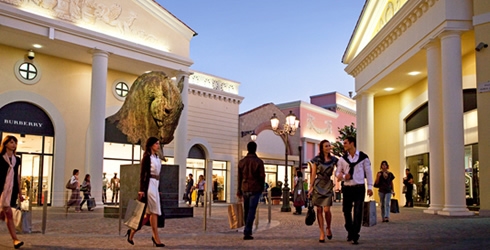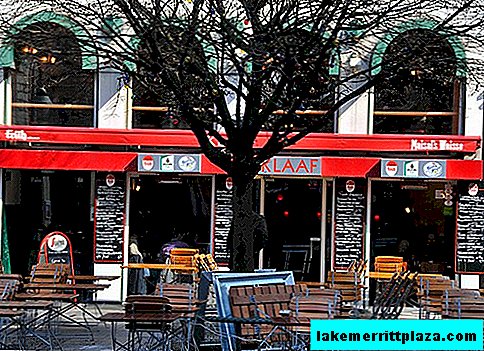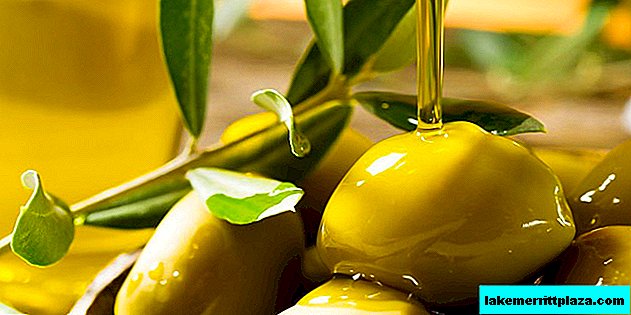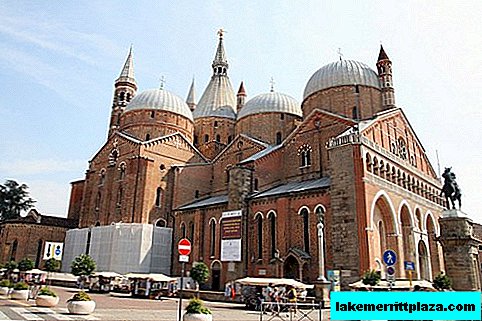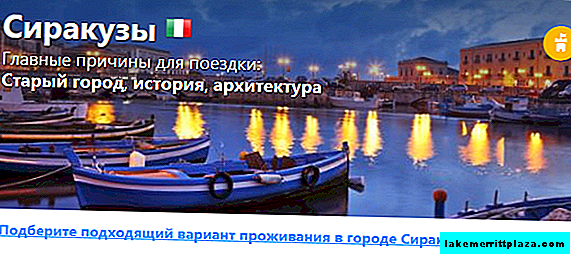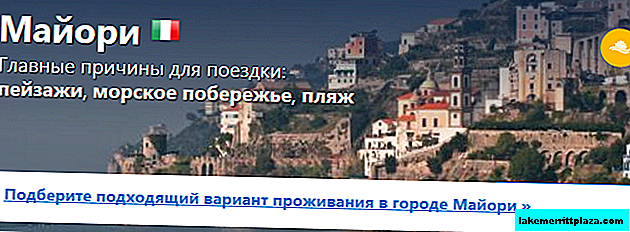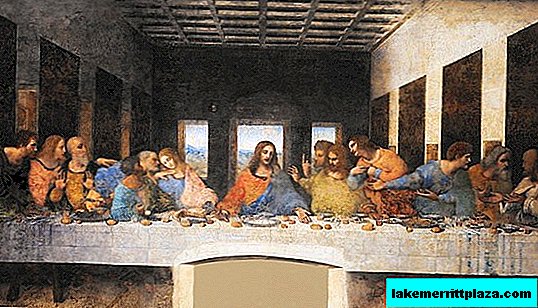For millennia, the Apennines have been inhabited by different peoples who have contributed to the formation of local culture, thanks to which the customs of modern Italy are an unusual mixture of different ethnic traditions regarding the family, religion, holidays and other areas of life of Italians. Despite the fact that some of the customs and traditions of Italy seem funny, and sometimes strange, it is worth getting acquainted with them, at least in order not to get into trouble on occasion.
Holiday traditions in Italy
Italians love holidays and celebrate them cheerfully and naturally, trying not to depart from traditions. For example, Christmas is always celebrated with family, and Easter with friends. There is even an Italian proverb - "Christmas is closer to relatives, Easter can be on the side." Traditional dishes are prepared for the Easter table, and in each region they are different. In Lazio, the lamb with giblets is certainly roasted, in Emilia Romagna green lasagna is cooked, and in the Campania sweet Neapolitan cakes are baked. Of course, there are Easter dishes spread throughout Italy - Casello (pie with sausage, eggs and cheese), pastor (pie with ricotta and wheat) and colomba (sweet bread in the shape of a dove).
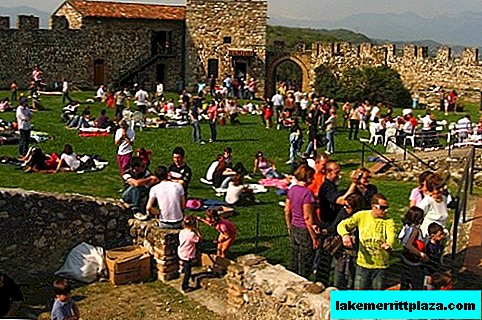
Italians have big family picnics on Easter Monday
But on Easter Monday everyone organizes large family picnics, and the picnic will take place in any weather, even if it rains heavily on the street. All kinds of games related to egg-rolling are also arranged on this day, and in the town of Panikale, instead of eggs, they roll cheese heads.
The New Year in Italy is traditionally celebrated on the street, where noisy festivities take place. But before you go to celebrate, you should observe the New Year customs and traditions - in Italy they are quite unusual. In addition to the well-known Italian tradition of throwing unnecessary things out of the window, there is a custom to beat dishes on New Year's Eve - it is believed that this action helps to get rid of all the insults and negative energy accumulated over the year.
Culinary New Year traditions of Italy they demand that a lentil dish be sure to be on the festive table - the more, the richer and more profitable the coming year will be. In some regions, it is considered mandatory to eat twelve grapes under the chiming clock, which symbolize 12 months of the coming year - grapes supposedly bring good luck. In Rome, they believe that in the coming year, one will be happy who on New Year's Eve jumps from a bridge into the waters of the Tiber River. In Naples, especially noisy and long-lasting fireworks are organized for the New Year - Neapolitans believe that loud explosions of crackers and firecrackers can scare away evil spirits.
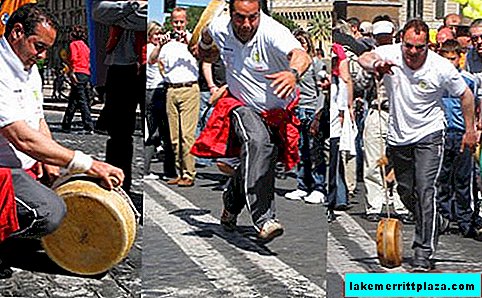
Italians arrange all kinds of games on Easter Monday
Family traditions in Italy
The main value for any Italian is his family, and the main treasure of every family is children. Children are very spoiled here, they are proud of, admire, rejoice at their every act and prohibit almost nothing. Parents, wherever they go - to a church, theater, restaurant or for any holiday - will certainly take their children with them. Kindergartens in Italy are not fashionable - grandparents or non-working mothers are usually engaged in small children.

The main value for any Italian is his family
You should know that asking Italians about the successes of their children is undesirable - they are very superstitious in these matters and believe that unfamiliar people should not brag about their offspring or complain about their health.
Italian men are strongly attached to their family, often they pay more attention to their mother, father, sisters and brothers than their spouses, which Italian women really dislike. Nevertheless, Italians are considered the most independent and emancipated in Europe, their power extends not only to household chores, but also to the social life of the family.
Italians are very superstitious, especially when it comes to marriage. Italian customs they do not recommend marriage in May, because everyone knows that this month is one unlucky day, but no one knows which one! It is also undesirable to get married on Friday, but Monday and Tuesday are considered the most successful days for the wedding. In order for the children to appear in the family as soon as possible, at the end of the wedding ceremony, the groom must give the bride a wheat spikelet, and in order to avoid strife with the mother-in-law, the bride gives the groom's mother an olive branch.
It is interesting that the tradition of throwing a bride’s bouquet in the direction of unmarried friends was born precisely in Italy. Initially, the bouquet consisted of orange tree flowers, symbolizing joy and well-being, as well as promising a quick marriage.
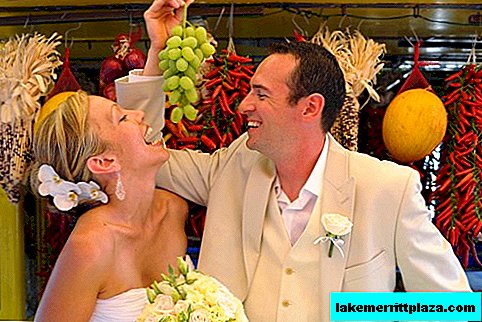
Monday and Tuesday are considered the most successful wedding days in Italy.
Communication traditions in Italy
Almost all Italians, regardless of the region of residence, are well acquainted with the rules of etiquette. This is manifested both in the behavior at the table, the ability to dress neatly and appropriately for the occasion, and in a respectful attitude to the elders and preventative - to the ladies. When acquaintance, a specialty or profession is certainly added to the name, probably to indicate social status.
At the entrance to the store you should say a greeting, and leaving must say goodbye - you will be considered sweet and well-mannered, even if you have not bought anything.
Expressive Italians speak loudly, gesturing fiercely during the conversation - this is quite acceptable, as is the somewhat unusual tradition of kissing and hugging in public, and kisses and hugs occur not only between people of different sexes. You should not be afraid of touching during a conversation: hugging the interlocutor by the shoulders or holding by the hand is another cute custom in Italy.

Italian men are very attentive to all members of their family
In large companies, everything is divided into small groups by gender or age: men communicate with men, women with women, ladies in age - with the same grandmothers, and children form their own circle. And it does not matter that they talk so loudly and emotionally that they often do not hear each other.
Similar articles:
- What NOT to do in Italy
- National Holidays in Italy
- Christmas in Italy
- Easter in Italy: dates, traditions and cuisine
- New Year in Rome, Venice and other cities of Italy
Photos by: gad-it.com, gad-it.com, toovia.com, exclusiveitalyweddings.com, usignolonews.com, huffingtonpost.com.

